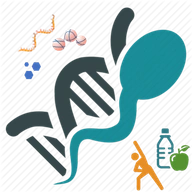Clinical Study: Diet and Exercise Modulate the Sperm Epigenome in Men
The purpose of this study is to see whether diet and exercise training in overweight Hispanic men improve the quality and quantity of sperm they produce. We are recruiting both overweight and normal-weight men for this study.
Our Study
Overweight participants will be randomly assigned to different treatment groups and will either receive exercise training, weight loss meals, both, or neither. Those in the last group will have the opportunity to receive weight loss meals at the end of the study if they choose.
Normal weight, healthy Hispanic men will be compared to overweight participants but will not be assigned to any treatment.
Participants will be compensated for their time
Who is eligible?
We are looking for healthy Hispanic/Latino men, who are 18-40 years old and are either normal weight or overweight.
Participants must have parents who are both from Mexico or Central America.
Participants must have reliable transportation to our facility in Torrance, CA.
What is involved?
Participants will have to undergo medical testing and physical examinations, including blood and semen samples.
Some participants will be given weight loss meals, exercise training, or both.
The length of the study for overweight participants, including follow-up, is ~1 year. The screening and treatment phases of the trial will last about 4 months.
The length of the study for normal-weight participants is 4-5 weeks.
How to join?
Please contact one of our study coordinators for more information about this trial and to learn if you are eligible.
Elizabeth Ruiz
Study coordinator
tel: 310.222.1728
email: eruiz@lundquist.org
Michael Massone
Study coordinator
tel: 310.222.1873
email: michael.massone@lundquist.org
Diet and Exercise Modulate the Sperm Epigenome in Men
The study is part of a project that will test our hypotheses that overweight and inactive lifestyle result in epimutations in the sperm epigenome relative to the normal epigenetic programming in lean and active men and that diet and exercise modulation leads to reversal of these epimutations resulting in both a healthier “phenotype” and “epigenotype” which may persist after stopping the interventions.

